喜福会人物介绍(课堂PPT)
- 格式:ppt
- 大小:132.00 KB
- 文档页数:10
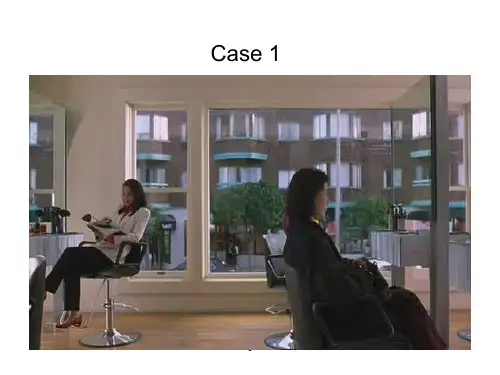
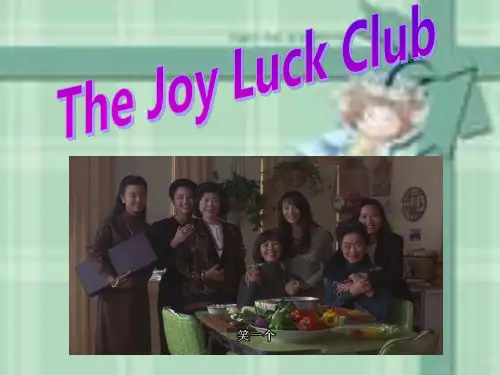
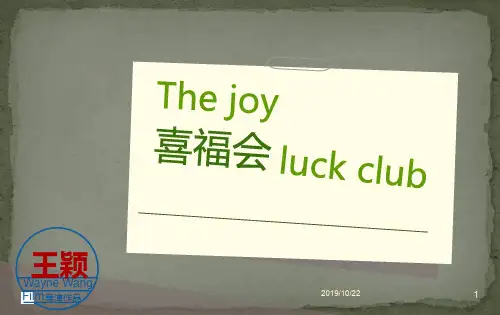
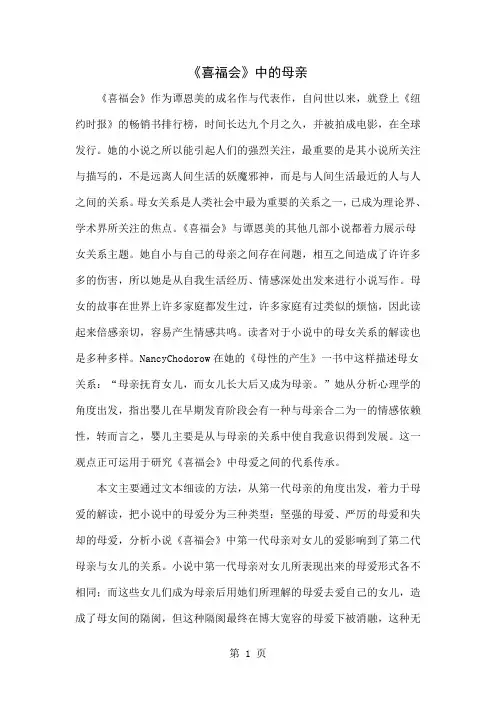
《喜福会》中的母亲《喜福会》作为谭恩美的成名作与代表作,自问世以来,就登上《纽约时报》的畅销书排行榜,时间长达九个月之久,并被拍成电影,在全球发行。
她的小说之所以能引起人们的强烈关注,最重要的是其小说所关注与描写的,不是远离人间生活的妖魔邪神,而是与人间生活最近的人与人之间的关系。
母女关系是人类社会中最为重要的关系之一,已成为理论界、学术界所关注的焦点。
《喜福会》与谭恩美的其他几部小说都着力展示母女关系主题。
她自小与自己的母亲之间存在问题,相互之间造成了许许多多的伤害,所以她是从自我生活经历、情感深处出发来进行小说写作。
母女的故事在世界上许多家庭都发生过,许多家庭有过类似的烦恼,因此读起来倍感亲切,容易产生情感共鸣。
读者对于小说中的母女关系的解读也是多种多样。
NancyChodorow在她的《母性的产生》一书中这样描述母女关系:“母亲抚育女儿,而女儿长大后又成为母亲。
”她从分析心理学的角度出发,指出婴儿在早期发育阶段会有一种与母亲合二为一的情感依赖性,转而言之,婴儿主要是从与母亲的关系中使自我意识得到发展。
这一观点正可运用于研究《喜福会》中母爱之间的代系传承。
本文主要通过文本细读的方法,从第一代母亲的角度出发,着力于母爱的解读,把小说中的母爱分为三种类型:坚强的母爱、严厉的母爱和失却的母爱,分析小说《喜福会》中第一代母亲对女儿的爱影响到了第二代母亲与女儿的关系。
小说中第一代母亲对女儿所表现出来的母爱形式各不相同;而这些女儿们成为母亲后用她们所理解的母爱去爱自己的女儿,造成了母女间的隔阂,但这种隔阂最终在博大宽容的母爱下被消融,这种无比生动而真实的母女亲情让人感动深思。
这是谭恩美想表达的主题,也是她的创作的理想。
小说结构安排上,吴素云与吴精美这对母女处于整个小说的核心地位,她们之间的母女关系是小说中整个华裔母女关系的一个典型。
吴精美作为一个美国出生并长大的女儿不仅是故事的开篇,也是故事的结尾。
吴素云是小说里唯一没有讲述童年生活经历的母亲。
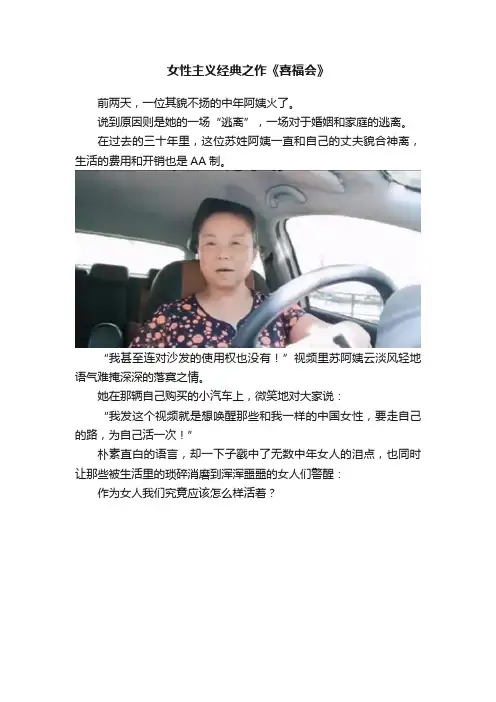
女性主义经典之作《喜福会》前两天,一位其貌不扬的中年阿姨火了。
说到原因则是她的一场“逃离”,一场对于婚姻和家庭的逃离。
在过去的三十年里,这位苏姓阿姨一直和自己的丈夫貌合神离,生活的费用和开销也是AA制。
“我甚至连对沙发的使用权也没有!”视频里苏阿姨云淡风轻地语气难掩深深的落寞之情。
她在那辆自己购买的小汽车上,微笑地对大家说:“我发这个视频就是想唤醒那些和我一样的中国女性,要走自己的路,为自己活一次!”朴素直白的语言,却一下子戳中了无数中年女人的泪点,也同时让那些被生活里的琐碎消磨到浑浑噩噩的女人们警醒:作为女人我们究竟应该怎么样活着?如果你想弄清这个问题,我建议你翻翻《喜福会》(The Joy Luke Club)。
作为华裔小说家谭恩美的处女作,《喜福会》一经面市,便造成了巨大的轰动,斩获各类大奖,成为经久不衰的畅销书。
在书中,谭恩美通过塑造一个个饱满的女性形象,不仅表现出了母女之间的深情,也以母亲的悲惨命运和女儿们的不幸婚姻为切入点,讲述了她们如何遭受男权社会的压迫以及走向反抗的过程,逐步让读者明白:女性寻找自我的过程,是异常艰辛的,但是即便如此,我们仍然不能放弃,不能认命,应当让世界听到我们的声音,即使微弱,也是一种力量!1九岁那年,许安梅再次见到了自己的母亲,尽管此时,她在安梅的眼中形同陌路,但是她仍认出了她,安梅说:“我知道她就是我的母亲,因为我能感受到她的痛苦。
”在母亲离开的那些年里,她对于母亲所有的印象来自于外婆,那个生养了母亲的女人。
“永远都不要提你母亲的名字。
说她的名字无异于往你父亲的坟头啐了一口。
”安梅的母亲出现的时候,外婆已经提不起力气来骂她了,因为她已经病入膏肓。
她就这样出现在外婆面前,舅母用恶毒的话咒骂她,她不回嘴;舅舅抽了她一个耳光,她也只是把头低得更深了。
多年前,因为守寡失节,嫁给了有钱人做小老婆,母亲早已被这个家族驱逐。
即使她早已不被家族承认,当外婆病重时,作为女儿她仍顶着巨大的压力和漫天的谩骂回到母亲身边,用一种最极端的方式进行最后一次忏悔——“母亲在自己的手臂上割下一片肉,眼泪从她的脸上淌下,血,也搭啦搭啦地滴在地板上。
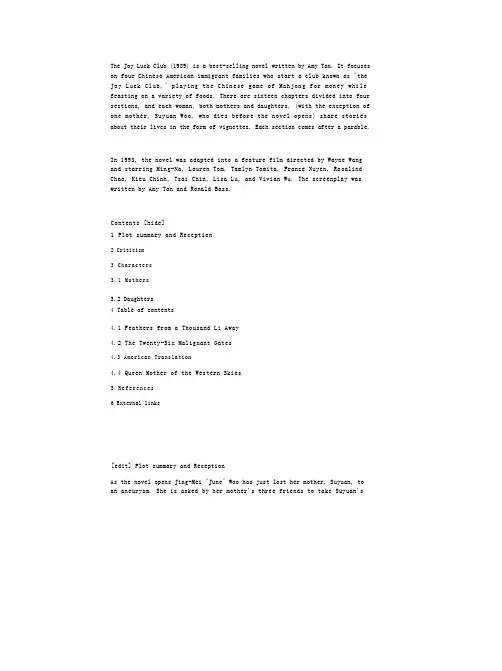
The Joy Luck Club (1989) is a best-selling novel written by Amy Tan. It focuses on four Chinese American immigrant families who start a club known as "the Joy Luck Club," playing the Chinese game of Mahjong for money while feasting on a variety of foods. There are sixteen chapters divided into four sections, and each woman, both mothers and daughters, (with the exception of one mother, Suyuan Woo, who dies before the novel opens) share stories about their lives in the form of vignettes. Each section comes after a parable.In 1993, the novel was adapted into a feature film directed by Wayne Wang and starring Ming-Na, Lauren Tom, Tamlyn Tomita, France Nuyen, Ro salind Chao, Kieu Chinh, Tsai Chin, Lisa Lu, and Vivian Wu. The screenplay was written by Amy Tan and Ronald Bass.Contents [hide]1 Plot summary and Reception2 Criticism3 Characters3.1 Mothers3.2 Daughters4 Table of contents4.1 Feathers from a Thousand Li Away4.2 The Twenty-Six Malignant Gates4.3 American Translation4.4 Queen Mother of the Western Skies5R e f e r e n c e s6 External links[edit] Plot summary and ReceptionAs the novel opens Jing-Mei "June" Woo has just lost her mother, Suyuan, to an aneurysm. She is asked by her mother's three friends to take Suyuan'splace in their Mah-Jong foursome and their "Joy Luck Club". The novel unfolds with interspersed chapters by each of the three remaining members of the Club and their American-born daughters. Lindo and Waverly Jong began their war over Waverly's childhood chess stardom and the effects it has on every aspect of Waverly's adult life. An-Mei Hsu recounts the tragedy that gave her strength, and worries that her daughter, Rose, lacks the same determination. Lena St. Clair tries to care for her eccentric mother, while her mother recounts a secret history that has allowed her to see more de eply than her daughter imagines. Through it all, June Woo tries to piece together the stories that her own mother can no longer tell, and to be faithful to her mother's memory despite their sometimes rocky relationship. This story of the bonds between m o t h e r s a n d d a u g h t e r s h a s b e e n p o p u l a r w i t h f e m a l e r e a d e r s.[edit] CriticismThough her book has been widely praised by critics, it has been criticized byn o t e d A s i a n A m e r i c a n a u t h o r F r a n k C h i n f o r p e r p e t u a t i n g r a c i s t stereotypes.[1][2][3][edit] Characters[edit] MothersS u y u a n W o oDuring the Second Sino-Japanese War, Suyuan lives in Kweilin (Guilin) while her husband at the time served as an officer in Chungking (Chongqing). She starts the onginal Joy Luck Club with her three friends to cope with the war. On the day of the Japanese invasion, Suyuan leaves her house with nothing but a b a g o f c l o t h e s,a b a g o f f o o d,a n d h e r t w i n b a b y d a u g h t e r s.During the long journey, Suyuan contracts such severe dysentery that she feels certain she will die. Fearing that a dead mother would doom her babies' chances of rescue, she reluctantly and emotionally leaves her daughters under a barren tree, together with all her belongings, along with a note asking anyone who might find the babies to care for them. Suyuan then departs, expecting to die, but is rescued herself. She later remarries, comes to America, forms a n ew J oy L uck Club wit h thre e ot her Chin ese fe mal e imm igra nts she me t atchurch, and has more children. But her abandonment of the twin girls haunts her for the rest of her life. After many years, Suyuan learns that the twins were adopted, but dies of a brain aneurysm before she can meet them. It is her A m e ri c an-bo r n d au g ht er J in g-m e i w ho fu l fi ll s he r lo n g-c he r is h ed w i s h o f reuniting with her elder twin half-sisters.As Suyuan dies before the novel begins, her history is told by Jing-mei, based on her knowledge of her mother's stories, anecdotes from her father, and what the other members of the Joy Luck Club tell her.A n-M e i H s uAn-Mei is raised by her grandparents and other relatives during her early years i n N i n g b o a f t e r h e r w i d o w e d m o t h e r s h o c k s t h e f a m i l y b y b e c o m i n g a concubine to a middle-aged wealthy man after her first husband's death. This becomes a source of conflict for the young An-Mei, as her aunts and uncles deeply resent her mother for such a dishonorable act, and they try to convi nce An-Mei that she is not fit to live with her disgraced mother; now forbidden to enter the family home. An-Mei's mother, however, still wishes to be part of her daughter's life. After An-Mei's grandmother died, she lives with her mother in t he h ome of h e r m othe r's ne w hu sban d, W u-Ts in g. A n-Me i le arns tha t herm o t h e r b e c a m e W u-T s i n g's c o n c u b i n e t h r o u g h t h e m a n i p u l a t i o n s o f h i s favorite concubine known as Second Wife, who arranged a plan for An-Mei's mother, still in mourning for her original husband, to be raped by Wu-Tsing. The stigma left An-Mei's mother with no choice but to marry Wu-Tsing and become his new but lowly Fourth Wife. She laterlost her baby son to SecondW i f e,wh o c l ai m ed th e b o y a s h e r ow n c h il d t o e n su r e h er pl a ce i n th e household. Second Wife also tried to win over An-mei upon her arrival in Wu-Tsing's mansion, giving her a necklace made of "pearls" that her mother later revealed were actually opaque glass orbs by crushing one with her foot.Wu-Tsing is a highly superstitious man, and Second Wife took advantage of this weakness by making false suicide attempts and threatening to haunt him as a ghost if he did not let her have her way. According to Chinese tradition, a person's soul comes back after three days to settle scores with the living. Wu-Tsing, therefore, was afraid to face the ghost of an angry or scorned wife. After Second Wife used a suicide attempt to prev ent An-Mei and her mother from getting their own household, An-Mei's mother successfully committed suicide herself. She timed her death so that her soul would be due to return on the first day of the new year, a day when all debts must be settled lest the debtor suffer great misfortune. With this in mind, Wu-Tsing promised to treat his Fourth Wife's children, including An-Mei, as if they were his very own flesh and blood by an honored First Wife. When Second Wife attempted to disrupt this, An-Mei crushed the fake pearl necklace Second Wife gave beneath herfeet to show her awareness of all the deception and to symbolize her new power over Second Wife, who now fears and realizes the bad karma she brought upon herself.An-Mei later immigrates to America, marries, and gives birth to children. Hery o un g es t so n, Bi n g, d i es in a d r ow ni n g ac c id e nt a t a y ou n g ag e.Lindo JongLindo is a strong-willed woman, a trait her daughter Waverly attributes to her having been born in the year of the Horse. When Lindo was only twelve, she was forced to move in with a neighbor's young son, Huang Tyan Yu, through the machinations of the village matchmaker. She married him when she was sixteen. She soon realized that her husband was just a little boy at hea rt and had no sexual interest in her. Lindo began to care for her husband as a brother, but her cruel mother-in-law expected Lindo to produce a grandson. She restricted most of Lindo's daily activities, eventually ordering her to remain on bed rest until she could conceive and deliver a child.Determined to escape this unfortunate situation, Lindo carefully observed the other people in the household and eventually formed a clever plan to escape her marriage without dishonoring herself or her family. She managed to trick her young husband's family that he was actually fated to marry another girl who was already pregnant with his "spintual child", and that her marriage to Huang Tyan Yu would only bring bad luck to the family. In reality, the girl in question was a mere servant in the household and indeed pregnant, but abandoned by her lover.Freed of her first marriage, Lindo decided to immigrate to America. She married a Chinese-American man named Tin Jong and has three children: sons Winston and Vincent, and daughter Waverly.Lindo experiences regret over losing some of her Chinese identity by living so long in America (she is treated like a tourist on a visit to China), however she expresses concern that Waverly's American upbringing has caused a barrier between them.Ying-Ying "Betty" St. ClairFrom a young age, Ying-Ying is told by her wealthy and conservative family that Chinese girls should be meek and gentle. She begins to develop a passive personality and repress her feelings as she grows up in Wuxi. Ying-Ying marries a charismatic man named Lin Xiao, not out oflove, but because she believed it was her fate. Her husband is revealed to be abusive and openly has extramarital relationships with other women. When Ying-Ying discovers that she is pregnant around the time her husband abandons her, she takesrevenge by killing his son before he is born and moving in with her poor relatives in the country.After ten years, she moves to the city where she meets an American man named Clifford St. Clair. He falls in love with her, but Ying-Ying cannot express the strong emotion after her first marriage. He courts her for four years before she agrees to marry him after learning that Lin Xiao had died, which she takes as the proper sign to move on. She allows him to control most aspects of her life, mistranslating her words and actions, and even changing her name to "Betty." They give birth to two children, one daughter, Lena and a stillborn son.Ying-Ying is horrified when she realizes that Lena has inherited her passive behaviors and trapped herself in a loveles s marriage with a controlling husband. She finally resolves to tell her daughter her story in the hope that she will be able to break free from the same passivity that ruined most of her young life back in China.[edit] DaughtersJing-Mei "June" WooJing-Mei has never fully understood her mother and seems directionless in life. During June's childhood, her mother used to tell her that she could be anything she wants; however, she particularly wanted her daughter to be gifted, like June's frenemy Waverly. At the beginning of the novel, June is chosen to replace her mother's seat in the Joy Luck Club after her mother's death. At the end of the novel, June is still trying to deal with her mother's death, and she visits China to see the twin half-sisters whom her mother had been forced to abandon when the Japanese attacked China.R o se Hs u Jo r da nRose is somewhat passive and is a bit of a perfectionist. She marries a doctor, Ted Jordan. After a malpractice suit, Ted has a mid-life crisis and decides to leave Rose, who he married, in part, to spite his mother. When Ted comes for the divorce papers, she finds her voice and tells him that he can't just throw her out of his life, comparing herself to weeds in his garden, once so beloved, now unkempt and filthy. She wants to hire a good lawyer and fight for possession of the house, which she eventually wins.Waverly JongWaverly is an independent-minded and intelligent woman, but is annoyed by her mother's constant cnticism. Well into her adult life, she finds herself restrained by her subconscious fear of letting her mother down. During theirc h i ld h o o d,J u ne a n d W a v e r l y b e c o m e c h i l d h o o d r i v a l s;t h e i r m o t h e r s compared their daughters accomplishments. Waverly was once a gifted chess champion, but quit after arguing with her mother, who used her daughters talent to show off.Lena St. ClairLena's husband, Harold, demands financial "equality" in their marriage. They are co-workers, but Lena is an associate while Harold is a partner, so he has a larger salary than she does. However, he insists that all household expenses be divided equally between them. Harold believes that by making everything equal, they can make their love equal as well, but Lena is frustrated with her life .[edit] Table of contents(Name of chapter is followed by the name of the narrator whose perspective is used for that chapter)[edit] Feathers from a Thousand Li Away"The Joy Luck Club," Jing-mei "June" Woo"Scar," An-Mei Hsu"The Red Candle," Lindo Jong"The Moon Lady," Ying-Ying St. Clair[edit] The Twenty-Six Malignant Gates"Rules of the Game," Waverly Jong"The Voice from the Wall," Lena St. Clair"Half and Half," Rose Hsu Jordan"Two Kinds," Jing-mei "June" Woo[edit] American Translation"Rice Husband," Lena St. Clair"Four Directions," Waverly Jong"Without Wood," Rose Hsu Jordan"Best Quality," Jing-mei "June" Woo[edit] Queen Mother of the Western Skies "Magpies," An-mei Hsu"Waiting Between the Trees," Ying-Ying St. Clair "Double Face," Lindo Jong"A Pair of Tickets," Jing-mei "June" Woo。
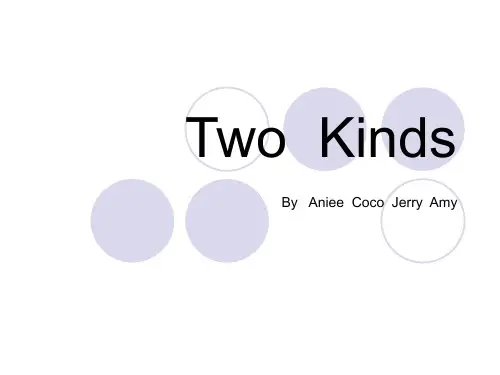
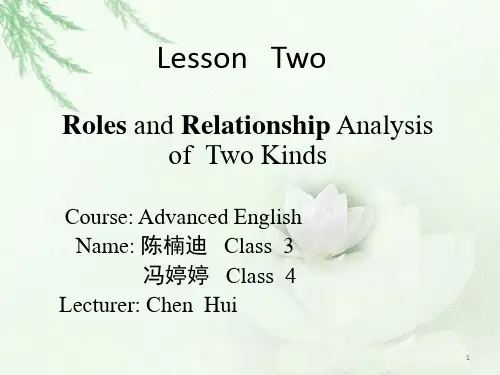
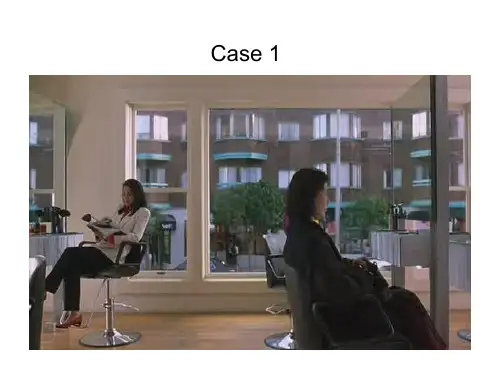
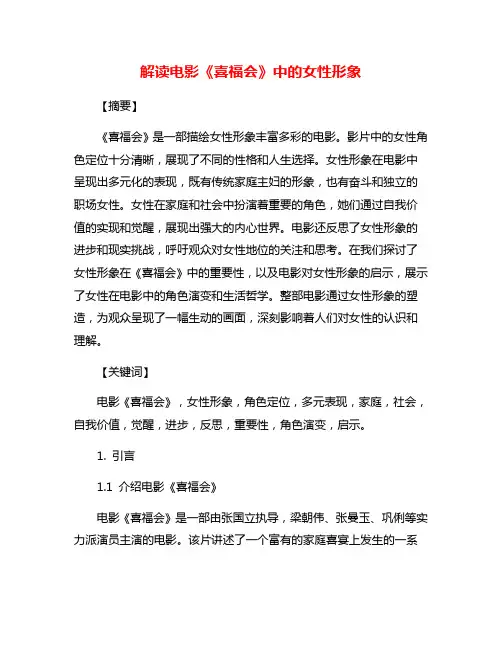
解读电影《喜福会》中的女性形象【摘要】《喜福会》是一部描绘女性形象丰富多彩的电影。
影片中的女性角色定位十分清晰,展现了不同的性格和人生选择。
女性形象在电影中呈现出多元化的表现,既有传统家庭主妇的形象,也有奋斗和独立的职场女性。
女性在家庭和社会中扮演着重要的角色,她们通过自我价值的实现和觉醒,展现出强大的内心世界。
电影还反思了女性形象的进步和现实挑战,呼吁观众对女性地位的关注和思考。
在我们探讨了女性形象在《喜福会》中的重要性,以及电影对女性形象的启示,展示了女性在电影中的角色演变和生活哲学。
整部电影通过女性形象的塑造,为观众呈现了一幅生动的画面,深刻影响着人们对女性的认识和理解。
【关键词】电影《喜福会》,女性形象,角色定位,多元表现,家庭,社会,自我价值,觉醒,进步,反思,重要性,角色演变,启示。
1. 引言1.1 介绍电影《喜福会》电影《喜福会》是一部由张国立执导,梁朝伟、张曼玉、巩俐等实力派演员主演的电影。
该片讲述了一个富有的家庭喜宴上发生的一系列故事,揭示了家族关系、权力斗争和人性的复杂性。
电影以其独特的叙事手法和深刻的人物塑造赢得了观众的好评。
《喜福会》以家庭为背景,通过不同女性角色的塑造展现了女性在家庭和社会中的多面性和复杂性。
影片中的女性形象丰富多彩,有传统的贤内助,也有独立自主的职业女性,她们各自展现了不同的人生态度和价值取向。
影片对女性的自我认知和觉醒也给观众留下了深刻的印象。
在电影《喜福会》中,女性形象的塑造不仅体现了电影的情节发展,更反映了当时社会对女性角色的认知和固有观念。
通过解读电影中女性形象的多重表现,我们可以更深入地理解电影中的人物关系以及故事情节的发展。
1.2 提出解读女性形象的重要性解读女性形象在电影《喜福会》中的重要性是非常必要的。
女性在社会中扮演着重要的角色,她们的形象不仅仅是为了衬托男主角的英雄形象,更是展现出女性在家庭和社会中的多样性和力量。
电影是一种艺术形式,它可以通过女性形象的表现来传递社会的价值观念和思想观念。
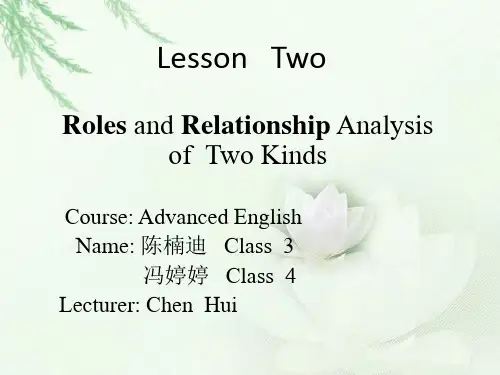
喜福会:战乱的苦难与团结的力量概述《喜福会》是一部以历史背景为基础的小说,通过讲述战乱时期人们的苦难和团结的故事,展示了人性坚强、互助相助的力量。
本文档将详细介绍该小说的情节、角色以及蕴含其中的主题。
小说情节概述故事发生在战乱肆虐、社会动荡不安的年代。
主角杨三儿是一个贫苦农民,在战乱中失去家庭,并被逼迁徙到边疆地区。
那里物资匮乏,人民生活艰难。
在这个艰难时期,杨三儿遇到了其他几个同样遭受苦难的人:刘二爷、张大娘和王四哥。
他们决定组成一个互助组织,称之为喜福会。
他们帮助彼此寻找食物、提供庇护所,并共同面对种种困难。
喜福会渐渐壮大,吸引了更多类似境遇的人加入其中。
他们学会了种植、经商,通过互相合作和支持,共同渡过困境。
然而,喜福会的存在并不被所有人接受。
地方官员和一些势力想要削弱他们的影响力,试图破坏组织。
但是通过众人的努力,喜福会成功抵挡住了这些威胁,并继续在社区中发挥着积极的作用。
人物角色介绍1.杨三儿:故事主角,失去家庭后坚定乐观,组建喜福会。
2.刘二爷:明理老实,为喜福会捣鼓各种生计项目。
3.张大娘:善于谋划和统筹协调,在喜福会中扮演重要角色。
4.王四哥:身怀武功,在外保护喜福会成员安全。
主题分析《喜福会》中表达了战乱时期人们面临苦难时所展现出的团结和互助精神的主题。
以下是对该主题进一步分析:1. 温暖的人性当战乱席卷整个国度时,人们往往陷入恐惧和绝望之中。
然而,在《喜福会》中,人们并没有因此沉沦,反而展现出坚强、乐观的一面。
通过互助组织的建立,他们相互支持、鼓舞,展现了人性的温暖与善良。
2. 团结力量大通过喜福会的形式,大家以团结合作的方式共同面对困境。
互相扶持、帮助彼此不仅让他们度过了难关,还一同创造了更好的生活条件。
团结不仅打败了外界的威胁,也展现出集体行动所带来的力量。
3. 自我价值与社区责任在战乱时期,喜福会成员通过发挥各自能力和资源,为整个社区提供帮助。
他们不仅解决了自身问题,还关心社会公益,并在有限条件下尽可能地为他人做出贡献。